On Sunday morning I briefly met Archbishop Emeritus Desmond Tutu (sorry Dot, no picture) before he gave a speech to a large crowd in City Hall square here in Copenhagen. One of the things I’m doing while here is producing video for the United Church of Canada, and here’s the first product of those efforts: selections from Tutu’s notable and influential speech. (If you don’t see the video embedded below, use this link.)
Category Archives: climate crisis
Morning briefing
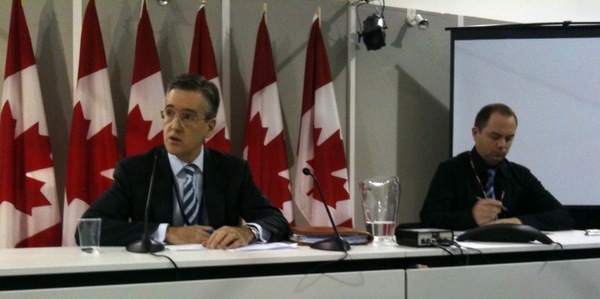 Every morning at 8am in the bowels of the Bella Center, Michael Martin, Ambassador for Climate Change and Chief Negotiator for the Government of Canada, holds a briefing for Canadian delegates. Intrigued, I caught the conference shuttle at 7am and made my way through the crowds and security, down the long hallways towards where the delegation offices are located. Canada’s offices, like the others, are small, temporary structures: the UN equivalent of an elementary school portable. I went trough a door and found myself sitting in the front row, feet away from the chief negotiator.
Every morning at 8am in the bowels of the Bella Center, Michael Martin, Ambassador for Climate Change and Chief Negotiator for the Government of Canada, holds a briefing for Canadian delegates. Intrigued, I caught the conference shuttle at 7am and made my way through the crowds and security, down the long hallways towards where the delegation offices are located. Canada’s offices, like the others, are small, temporary structures: the UN equivalent of an elementary school portable. I went trough a door and found myself sitting in the front row, feet away from the chief negotiator.
Initially impressed
The purpose of the meeting is for Martin to update on how talks are going and to take questions and comments from those in attendance. The discussion contained a lot of detail and all of the acronyms you can expect at a UN meeting (REDD stands for Reducing Emissions from Deforestation and Forest Degradation, AWG-KP refers to the Ad hoc Working Group on further commitments for Annex I Parties under the Kyoto Protocol, etc). I was initially impressed both with the knowledge displayed by the NGOs asking questions and by the detail of Martin’s answers. What also impressed me was that comments and opinions were explicitly welcomed. When a labour leader asked a question about a particular component of an agreement, Martin’s response was to say that he wasn’t yet familiar with the specifics but would welcome input on what Canada’s position should be.
In this way, Martin comes across as (and I think likely is) a dispassionate reasonable person, trying to do the best job he can and genuinely open to input from civil society. The catch is that this only applies to the micro level of a negotiating position that is flawed at the macro level.
I’m sorry, your question cannot be answered as asked
Leave it to members of the Canadian Youth Delegation to shine a light on that contradiction. (I hope it won’t come across as patronizing or pandering when I say thank goodness the youth delegates are here and making their voices heard. I’m witnessing first hand their intelligence, commitment and tenacity.) Devon Willis, a student at McGill University in Montreal, pointed out that at Monday’s briefing the room was full of “professionals, academics, workers, farmers, youth, students” and “representatives from indigenous communities and arctic communities.” In other words, she said, “all Canadians are concerned about this issue…it’s not a particular interest group that can be shoved away and not addressed.”
I smiled as I realized where she was going with this. Her question was, since groups from all over Canada are represented and expressing support for stronger action at these talks, “which Canadians are being represented in the position that Canada has taken at this conference, specifically?”
That’s the kind of question that Martin can’t touch. “You’re posing a political question and I’m not the guy,” he said, inadvertently drawing attention to the fact that “the guy,” Minister of the Environment Jim Prentice, does not make himself available to us for questions. “My role as chief negotiator is to work with government, provide advice, help develop options. When the government makes decisions on positions then it’s my job to represent those positions.” He’s not wrong, of course, but personally I couldn’t tolerate being in his position. There comes a point where “just doing my job…just following orders” isn’t a good enough defence.
Opacity level rising
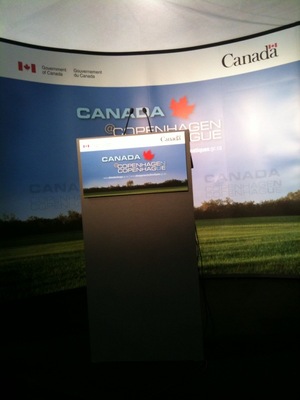
Willis’ next question, a good one in my opinion, was about the dwindling numbers of NGO delegates who are allowed to enter the Bella Center where these meetings take place. Out of tens of thousands of people, by Thursday only 1,000 will be let in. By Friday that number will be reduced to 90. “Is there an alternative meeting place we can have so we can keep this dialog open?”
Again, that wasn’t Martin’s problem. “We don’t control the conference and it is true we are getting into crunch time,” he said. “I cannot offer you a different option at this meeting than this one. It’s just a constraint of the organization. I’ll be ready to meet here at 8am with those who are able to have access.” Transparency of the process, which is withering fast, is not the government’s concern.
The CBC bombshell
Another member of the youth delegation, Caroline Lee, brought up the topic that’s generating the most buzz today, a report that says Canada is poised to abandon some of their already week emission reduction goals. Its being seen as proof that Canada has no intention of meeting its own targets and is therefore negotiating in bad faith. Lee knew that Martin wouldn’t address the political dimensions of the report, so she took a different tact, trying to ask him a question he should be able to answer. “How does [this report] affect Canada’s credibility in a forum like this where both developed and developing countries are ramping-up ambition, taking stronger action on climate change, and Canada’s position appears to be moving backwards?”
“First,” Martin said, “the government has made clear what its 2020 target is and we have made clear that we are working to put in place the policies and measures that will achieve that target.” Well, ok, there isn’t any objective third party in Canada that would agree that’s true, but go on. “The second part relates to we are seeking both for reasons of environmental effectiveness and economic efficiency to align and harmonize our approaches with those of the United States.” Sounds good if we weren’t, in reality, already behind the United States’ inadequate progress.
Moving on
30 minutes had passed and Lee’s question was declared the last. Out in the hall the Canadian Youth Delegation knew they had been intentionally stonewalled. They don’t blame Martin; they recognize that Jim Prentice has placed him in the middle as a barrier between himself and citizens. NDP MP Linda Duncan, who was also in the briefing, tried to offer them some words of encouragement and affirmed that they were asking the right questions.
Now, the youth have turned to direct action. As I write this they are organizing a “lie-in” to take place inside the Bella Center. The point is to “express that the Canadian government has LIED to us, and we are unsatisfied with current emissions reductions target.”
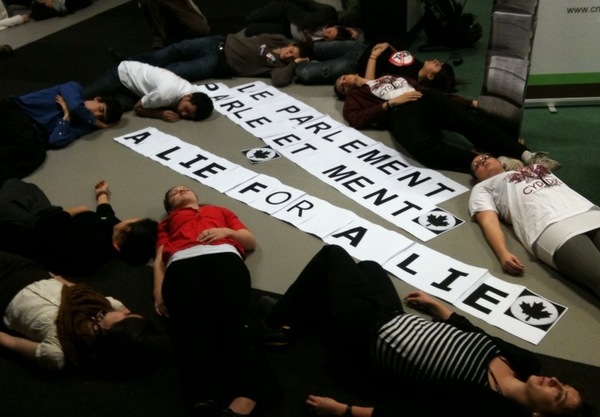
This post has been scheduled to go live at the moment the lie-in begins (updated at 10am EST with the photo of the lie-in). Photos by me and my iPhone. Opinions expressed are my own and not those of any other organization or group.
Copenhagen: Monday
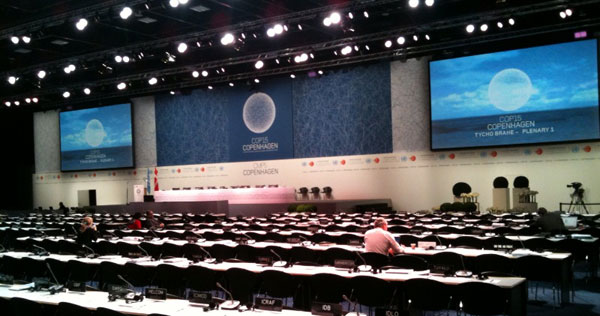 Today I spent my morning in the Bella Center, where the main conference is taking place, for the first time. It may also be the last time. Reports say that there are 45,000 people now registered, but capacity is only 15,000. Starting tomorrow admission to the Bella Center will be further restricted and delegates will require a second, rationed pass to get in. (My NGO has 19 passes to share between 89 delegates.)
Today I spent my morning in the Bella Center, where the main conference is taking place, for the first time. It may also be the last time. Reports say that there are 45,000 people now registered, but capacity is only 15,000. Starting tomorrow admission to the Bella Center will be further restricted and delegates will require a second, rationed pass to get in. (My NGO has 19 passes to share between 89 delegates.)
You might expect that a planning failure of that magnitude would be greeted with frustration, but so far I’ve witnessed very little. Instead, everyone I’ve met seems determined to contribute as positively to the process as they can, whether within the official conference or without. We’ll see how long that lasts, however. We’re talking about people from well-established NGOs who have traveled from all over the world to be here and who have gone through the proper registration process only to be turned away. Fewer observers will be admitted every day this week. According to one report by Friday only 90 people from NGOs will be let in. 90. Out of tens of thousands. It could get tense.
Climate change you can believe in
The context of the conversation that’s taking place in Copenhagen is entirely different from that in North America. Instead of arguing about if climate change is a real and serious concern or predicting future consequences if we don’t act, the narrative here is that dangerous climate change is already a reality.
At a powerful ecumenical service yesterday led by Archbishop Emeritus Desmond Tutu and the Archbishop of Canterbury Rowan Williams, three choirs from three corners of the Earth brought with them symbols of how climate change is affecting their lives: rocks uncovered from melting glaciers in Greenland, dead, bleached coral from the Pacific ocean, and dried up maize from Africa.
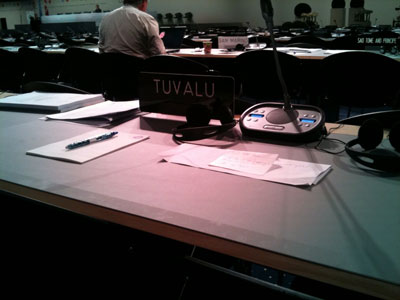 Today I listened to a man from the island nation of Tuvalu, which is emerging at this meeting as a symbol of why we must act. The highest point in Tuvalu is 4.5 meters above sea level. In other words, unless we aggressively reduce the concentration of carbon dioxide in the atmosphere, this nation will slip beneath the waves. Negotiators from Tuvalu have been strongly pushing for tough, binding targets in plenary, and the tiny state has captured the imagination of many of the NGO delegates, particularly the youth.
Today I listened to a man from the island nation of Tuvalu, which is emerging at this meeting as a symbol of why we must act. The highest point in Tuvalu is 4.5 meters above sea level. In other words, unless we aggressively reduce the concentration of carbon dioxide in the atmosphere, this nation will slip beneath the waves. Negotiators from Tuvalu have been strongly pushing for tough, binding targets in plenary, and the tiny state has captured the imagination of many of the NGO delegates, particularly the youth.
Through this lens, the Canadian government’s pathetic non-participation in the negotiations is seen as not just embarrassing, but cruel. The world’s poorer countries believe they are already suffering, and that people are already dying, because of the actions of the world’s richer countries. For them it is as if the United States, Canada, and Europe are turning a giant tap that slowly drowns them while they cry out in vain. The immorality becomes blatant and blaring. And yet they continue to chose hope over anger; it’s remarkable.
Explaining Canada
 One thing that does unite representatives from European countries and the countries of the south is their complete shock, dismay, and confusion at the role that Canada is playing. Whereas most developed countries are promising emissions reductions in the range of 20-40% below 1990 levels, Canada is offering a 3% reduction. Whenever I’ve told that to someone they’ve assumed they’ve misheard me; it’s unbelievably poor.
One thing that does unite representatives from European countries and the countries of the south is their complete shock, dismay, and confusion at the role that Canada is playing. Whereas most developed countries are promising emissions reductions in the range of 20-40% below 1990 levels, Canada is offering a 3% reduction. Whenever I’ve told that to someone they’ve assumed they’ve misheard me; it’s unbelievably poor.
So then I get into conversations about the fact that the majority of Canadians support action, that the vast majority of Canadians voted for parties that support taking action, etc. Not that that’s much consolation. Still, I feel like it’s one of my more important roles to help people understand how Canada’s gone so wrong, and how so many of us are working to make it better.
Waiting for Obama
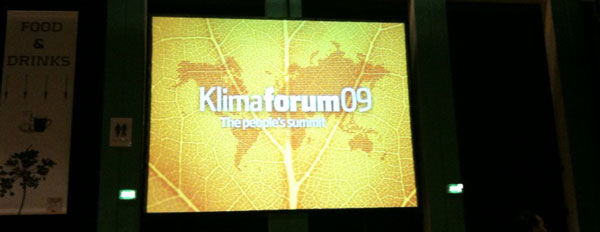 According to Bill McKibben of 350.org, who spoke earlier today at Klimaforum, the parallel “people’s summit,” there is a team from MIT here in Copenhagen with powerful computers. Their job, at the end of each day, is to look at all of the commitments that countries have offered that day and calculate how many parts per million of carbon that would mean for the atmosphere. Before the industrial revolution that number was around 280ppm, anything above 350ppm is unsafe, and today we’re at approximately 380ppm. According to the MIT projections, if an agreement were signed today as-is we’d be on our way above 700ppm. “If that isn’t literally hell,” McKibben said, “it would look a lot like it.”
According to Bill McKibben of 350.org, who spoke earlier today at Klimaforum, the parallel “people’s summit,” there is a team from MIT here in Copenhagen with powerful computers. Their job, at the end of each day, is to look at all of the commitments that countries have offered that day and calculate how many parts per million of carbon that would mean for the atmosphere. Before the industrial revolution that number was around 280ppm, anything above 350ppm is unsafe, and today we’re at approximately 380ppm. According to the MIT projections, if an agreement were signed today as-is we’d be on our way above 700ppm. “If that isn’t literally hell,” McKibben said, “it would look a lot like it.”
In other words, we’ve got a long way to go. And so, a lot of hope rests on the arrival of U.S. President Barack Obama on Friday. At lunch yesterday we quipped, “when he walks into a room everything just gets fixed, right?” The statement was 70% joke and 30% willful delusion. “Oh, you’re Canadian,” our American friend said. “You still believe that. We know better.”
Back at Klimaforum, McKibben predicted that Obama would likely make a beautiful speech, but that no speech was beautiful enough to alter the scientific and moral imperative to begin reducing global greenhouse gas emissions by 2015 at the latest. “The laws of nature will not be swayed by Barack Obama’s oratory,” he said, “but they would be swayed by his action.”
All pictures by me and my iPhone
Delirious in Copenhagen
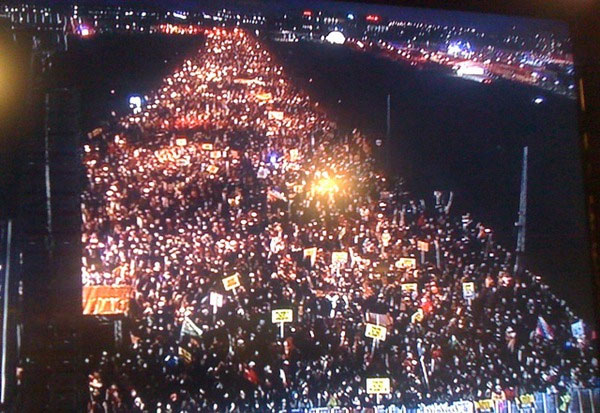
I arrived in Copenhagen this morning after an all night flight with a connection in Frankfurt. We went straight from the airport to the Bella Center [sic] to register for the conference, which involved standing in the cold for what felt like hours and then going through airport-style security. (Success, I now have my photo ID delegate badge.) From there to the hotel and a resturant for food, and that’s all I’ve done today.
At first, Copenhagen struck me not as a city but as a United Nations theme park. From the moment you get off the plane everything is related to this 15th Conference of the Parties (COP15) to the UN Framework Convention on Climate Change. All the ad spaces have been purchased (many featuring aged renderings of our leaders in 2020 looking regretful that they didn’t reach a deal) and there is a gauntlet of people wishing to welcome you with conference-related flyers, not unlike walking down the strip in Los Vegas (though decidedly more family-friendly). The warm welcome/assault continues all the way from the airport, via transit, to the Bella Center.
However, once we got away from the Bella Center and into the city core (where our hotel is) I saw reassuring glimpses of Copenhagen carrying on as usual, biking around in sub-zero temperatures and generally being charming.
It took me awhile to calculate how many hours I’ve now been without sleep. The answer is 30. I blame the delayed calculation partly on the time change, and partly on the answer to the equation itself.
I have one more event to make an appearance at tonight, then I’ll go to sleep and wake up tomorrow perfectly synced with Central European Time, aka GMT+1.
Meanwhile, as I sit here in my hotel room trying to regroup, the above photo is what’s happening outside. It’s the largest climate demonstration ever, and through my window all I hear is every church bell in the city ringing like crazy.